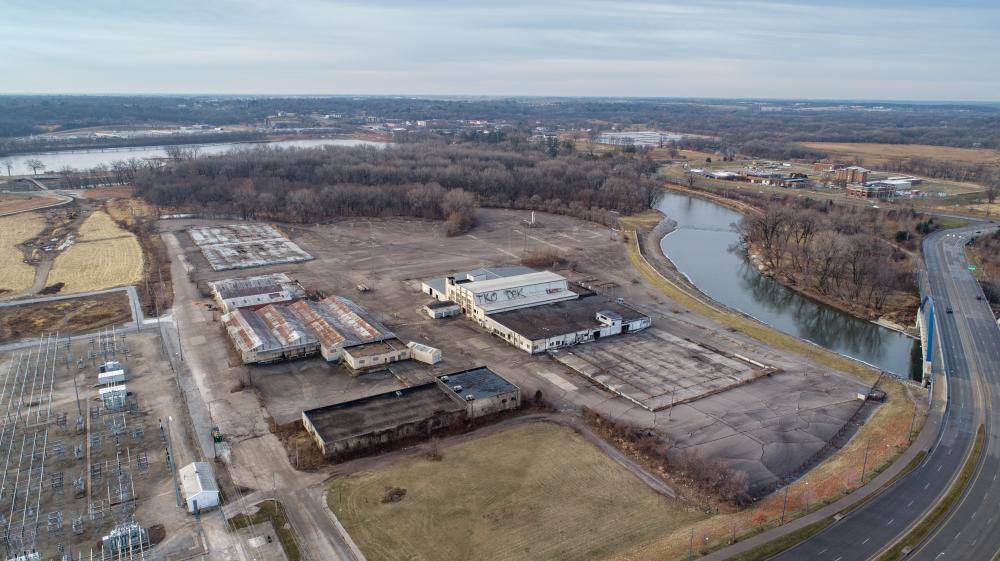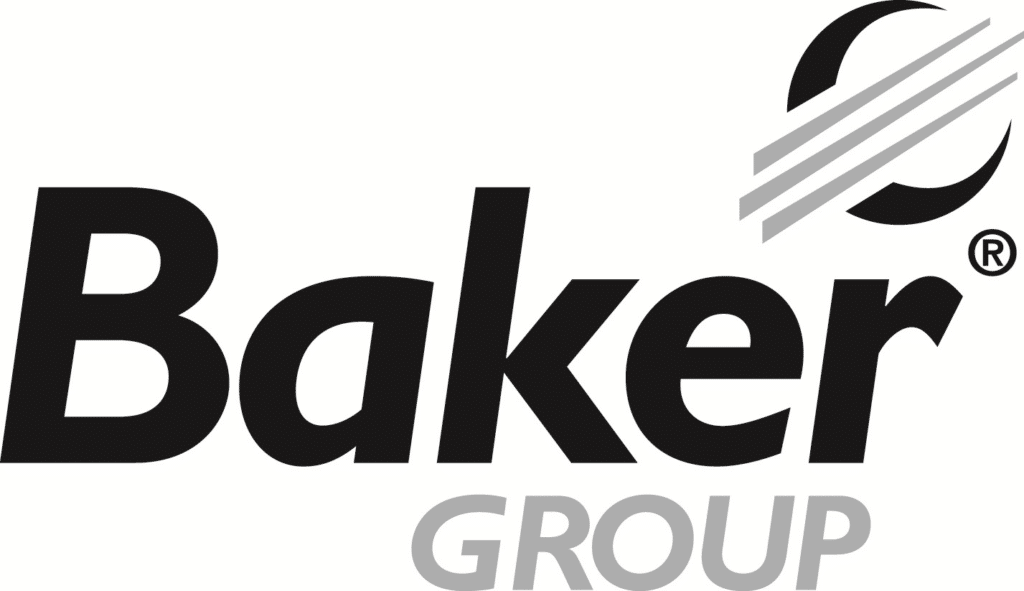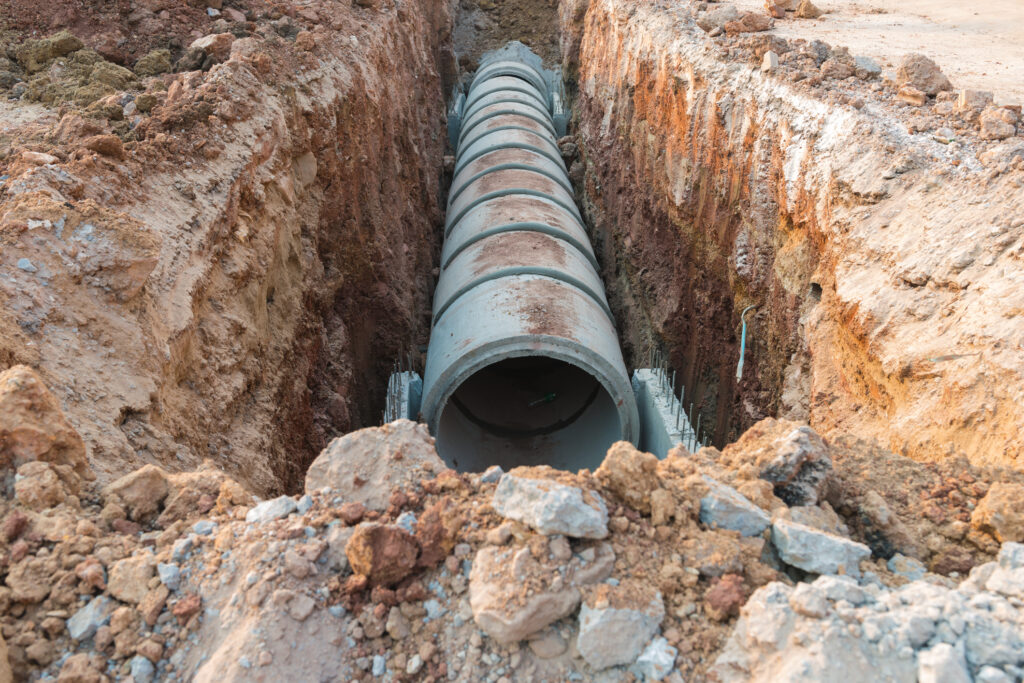Panelists speculate on future of office space during discussion about downtown Des Moines

KATHY A. BOLTEN Dec 11, 2020 | 7:57 pm
3 min read time
791 wordsAll Latest News, Economic Development, Government Policy and Law, Real Estate and DevelopmentAn outdoor entertainment arena that would include a stadium for soccer and other events could be located on the former Dico Inc. site that has been unused for 25 years. Photo by Duane Tinkey
It may take two or more years to see the full impact the pandemic has had – and will have – on office use and development, panelists said during a discussion about top downtown Des Moines projects in 2021.
“I think the definition of ‘office’ is going to expand even more than it already has,” Kris Saddoris, vice president of development for Hubbell Realty Co., said during the virtual discussion presented by the Des Moines Downtown Chamber of Commerce. “We see it rolling into our homes and multifamily businesses. I think we’ll see even more of that.”
Consequently, not all workers may return to a traditional office when the pandemic ends, the panelists said. And if that occurs, thousands of square feet of Des Moines-area office space may sit empty.
“Anyone who owns an office building right now is very, very interested in how much of that comes back” after the pandemic, Saddoris said.
Tim Leach, vice president of economic development for the Downtown Community Alliance, said the phrase “Are they going to come back?” is used frequently.
“The people never left,” Leach said. “They’re still here. The amenities that the development community, the cities, the counties, have built up over the years, they are still here.”
Leach said he believes more office workers will return to the traditional office space than some think.
“The one thing I hold out hope on the office question is the fun factor,” he said. “People like to be around people. There is a fun factor about work and going to work and seeing people in a creative collaboration around the office. That is what I hold out hope for.”
Other things highlighted during today’s virtual discussion include:
Redevelopment along Mulberry Street
“I think the definition of ‘office’ is going to expand even more than it already has,” Kris Saddoris, vice president of development for Hubbell Realty Co., said during the virtual discussion presented by the Des Moines Downtown Chamber of Commerce. “We see it rolling into our homes and multifamily businesses. I think we’ll see even more of that.”
Consequently, not all workers may return to a traditional office when the pandemic ends, the panelists said. And if that occurs, thousands of square feet of Des Moines-area office space may sit empty.
“Anyone who owns an office building right now is very, very interested in how much of that comes back” after the pandemic, Saddoris said.
Tim Leach, vice president of economic development for the Downtown Community Alliance, said the phrase “Are they going to come back?” is used frequently.
“The people never left,” Leach said. “They’re still here. The amenities that the development community, the cities, the counties, have built up over the years, they are still here.”
Leach said he believes more office workers will return to the traditional office space than some think.
“The one thing I hold out hope on the office question is the fun factor,” he said. “People like to be around people. There is a fun factor about work and going to work and seeing people in a creative collaboration around the office. That is what I hold out hope for.”
Other things highlighted during today’s virtual discussion include:
Redevelopment along Mulberry Street
Central Iowa Shelter & Services is planning a $4.9 million expansion of its shelter at 1420 Mulberry St. that includes the addition of 24 new studio apartments. Also planned is an agrihood that will feature an aquaponic system to grow tilapia and several varieties of lettuce.
“To me, this is visionary and forward-thinking,” Leach said. “To imagine a neighborhood integrated with the issue of homelessness and food insecurity is just amazing. … And as the phases continue, there will be pocket parks, mixed-use retail and housing.”
On the north side of Mulberry Street, 13th & Mulberry LLC is proposing a $22.7 million project that includes the historic renovation of a one-story brick building at 213 13th St. and the construction of a mixed-use building with at least five stories across the street on the west side of 13th Street. The mixed-use building is proposed to include 80 apartments and street-level retail.
“This is going to be an amazing part of town,” Leach said.
Redevelopment of the former Dico site
Krause Group and Iowa Soccer Development Foundation Inc. have proposed moving a proposed multiuse stadium about two blocks west to the abandoned Dico Inc. manufacturing site at 200 S.W. 16th St.
The 43-acre site has been unoccupied for 25 years because of ground contamination. In September, Des Moines officials announced that the city would take ownership of the site, located east of the Raccoon River and south of Martin Luther King Jr. Parkway. A few weeks later, the proposal to move the multiuse stadium to the site was announced.
The “soccer-specific” stadium and surrounding plaza could be used for other sporting activities, concerts, festivals and other activities.
People bringing visitors arriving from the airport to downtown cringe when they turn the corner from Fleur Drive to Martin Luther King Jr. Parkway, Saddoris said. As the site is redeveloped, “many community events will happen there outside of soccer. The critical nature of that site elevates [its redevelopment] even more.”
Redevelopment along Sixth Avenue
Numerous improvements are occurring along a portion of Sixth Avenue in Des Moines’ Highland Park/Oak Park neighborhood, located about 3 miles north of downtown. The building that houses Chuck’s restaurant, a longtime local establishment, is being remodeled. Slow Down Coffee Co. opened in November in space previously occupied by Highland Park Hardware. The Hiland Bakery, which closed in 2019, reopened in January under new ownership. Des Moines Mercantile opened at 3707 Sixth Ave. and a local developer plans to buy and rehabilitate buildings at 3523 and 3524 Sixth Ave.
“This is a historic corridor,” Breann Bye, executive director of the Sixth Avenue Corridor, said. “It was a streetcar line that really flourished because the streetcar connected [the neighborhood] to downtown. … All of our corridors still really do connect to downtown and help support and strengthen downtown.”
“To me, this is visionary and forward-thinking,” Leach said. “To imagine a neighborhood integrated with the issue of homelessness and food insecurity is just amazing. … And as the phases continue, there will be pocket parks, mixed-use retail and housing.”
On the north side of Mulberry Street, 13th & Mulberry LLC is proposing a $22.7 million project that includes the historic renovation of a one-story brick building at 213 13th St. and the construction of a mixed-use building with at least five stories across the street on the west side of 13th Street. The mixed-use building is proposed to include 80 apartments and street-level retail.
“This is going to be an amazing part of town,” Leach said.
Redevelopment of the former Dico site
Krause Group and Iowa Soccer Development Foundation Inc. have proposed moving a proposed multiuse stadium about two blocks west to the abandoned Dico Inc. manufacturing site at 200 S.W. 16th St.
The 43-acre site has been unoccupied for 25 years because of ground contamination. In September, Des Moines officials announced that the city would take ownership of the site, located east of the Raccoon River and south of Martin Luther King Jr. Parkway. A few weeks later, the proposal to move the multiuse stadium to the site was announced.
The “soccer-specific” stadium and surrounding plaza could be used for other sporting activities, concerts, festivals and other activities.
People bringing visitors arriving from the airport to downtown cringe when they turn the corner from Fleur Drive to Martin Luther King Jr. Parkway, Saddoris said. As the site is redeveloped, “many community events will happen there outside of soccer. The critical nature of that site elevates [its redevelopment] even more.”
Redevelopment along Sixth Avenue
Numerous improvements are occurring along a portion of Sixth Avenue in Des Moines’ Highland Park/Oak Park neighborhood, located about 3 miles north of downtown. The building that houses Chuck’s restaurant, a longtime local establishment, is being remodeled. Slow Down Coffee Co. opened in November in space previously occupied by Highland Park Hardware. The Hiland Bakery, which closed in 2019, reopened in January under new ownership. Des Moines Mercantile opened at 3707 Sixth Ave. and a local developer plans to buy and rehabilitate buildings at 3523 and 3524 Sixth Ave.
“This is a historic corridor,” Breann Bye, executive director of the Sixth Avenue Corridor, said. “It was a streetcar line that really flourished because the streetcar connected [the neighborhood] to downtown. … All of our corridors still really do connect to downtown and help support and strengthen downtown.”










